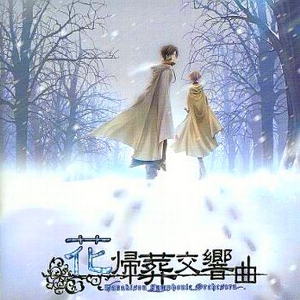Hanakisou Symphonic Orchestra
 |
Album Title: Hanakisou Symphonic Orchestra |
| Record Label: WAYUTA |
|
| Catalog No.: WACD-501 |
|
| Release Date: March 30, 2007 |
|
| Purchase: Buy at Amazon JP |
Overview
Well, I’m not sure how it happened, by Akiko Shikata’s fantastic score for the visual novel Hanakisou received an orchestral arrangement in 2007. Arranged by Shikata and Kousuke Suzuki, the Moscow International Symphonic Orchestra impressively performed the album. Despite being only 14 tracks long, most major themes from the title are represented here and, except for the very opening of the first track, Shikata’s signature vocals are surprisingly absent. This is a Shikata album unlike any else, so how does it fare?
Body
As stated in the overview, the album’s first title, “Nevicata,” is the only one to feature Shikata’s vocals. Here they are used rather sublimely for effect, to introduce the piece, which expands quite graciously. Shikata’s orchestration isn’t amazingly profound, but it works quite well, adding a new dimension to this short, somber piece. “Savior -Hanashiro-” receives a grand arrangement with lots of force and emotion behind it, thanks to heavy brass use, which is balanced quite exquisitely by the strings. I can’t fault the Moscow International’s performance here and it brings new weight to Shikata’s original work.
Moving to the character themes, the militaristic “Ginshu’s Theme” is back in full force. This arrangement is somewhat atypical, with portions of the string section being syncopated in an unusual way. It nevertheless actually works. “Shirofukurou’s Theme” receives an elegant arrangement, particularly from the introduction of marching drums in the theme’s repetition, an addition that serves the original melody well. Similar comments can be made about the arrangement of “Kuroto’s Theme” that, despite a simple start, ends up sounding majestic. The drums bow out for the melody’s second theme, leaving the strings to expertly conclude the stirring arrangement.
Breaking the mold a bit, “Researcher’s Theme” is much more laidback, choosing to focus mainly on piano and a violin. There is quite a bit going on otherwise, in the woodwinds and xylophone, to augment the theme. “If the Gentle Breeze Blows” starts off quite simply and expands rather graciously, mirroring its original. It’s a fine arrangement that does the original justice, though I wish it was slightly more extended. “Flower Funeral” receives a bit of a fierce arrangement. What was originally a typical Shikata vocal piece becomes something so much more thanks to a fantastic orchestration, perhaps becoming the best version of the piece, though one that is over too quickly.
Nearly half of the soundtrack are compilation themes, containing two or more themes in one track. I honestly cannot figure out why, as, besides for one track, none of the themes benefit from being lumped into companionship. Furthermore, the themes don’t blend into one another, except for the aforementioned. Instead, one ends with the next starting up again a second later — these are far from the most sophisticated suites in game music. An example is “Outside of the Miniature Garden ~ Lamb of God”. The first half proves one of the best interpretations on the album. “Lamb of God” comes completely out of nowhere and is quite ferocious. While it is a great arrangement of a spectacular track, it doesn’t make much sense to combine it with its predecessor.
The most egregious offender by far is “The Magnificent Dining Table of a Certain Mr. K ~ Nostalgia”. The first half is silly and entirely uninteresting, perhaps the only piece on the album to be less interesting than its original, which was only interesting because of its quirkiness, all of which is lost in the arrangement. The second half is the austere “Nostalgia,” which is as fantastic here as it was there, but feels rather stilted shoved at the end of this track, with not nearly enough time given to expanding it. “The Tear ~ Twilight ~ A Gear Towards an End” combines three pieces into one, making it the longest track on the album. “The Tear” is peaceful and gentle, focusing on piano and woodwinds, over a bedrock of quite pleasant strings. “Twilight” is still one of my personal favorites, and its arrangement is quite fantastic. Again, though, the relative ferocity of “A Gear Towards an End” comes in quite suddenly and entirely offsets the peacefulness of the previous two pieces. To add insult to injury, it’s quite short and ultimately unneeded. The arrangement is exciting, but there’s barely any of it to speak of.
The first half of “The Town’s Breath ~ Market Scenery” is enjoyable and fun, with an air of seriousness, like its original. The orchestration does it fair justice, fortunately. Also fortunately, it fits well with “Market Scenery,” both thematically and in terms of tone. “Smile ~ Memory” also works quite well as a compilation. “Smile” is sweet and memorable, receiving a gentle orchestration heavy on strings and woodwinds. The piece develops quite well, and matches well with “Memory,” of which similar comments are appropriate. Of all the compilations, the only one that tries to blend its tracks together is “Chance Meeting ~ Something White that Continues to Fall,” which accomplishes it quite well. While the gap between them still exists, it feels less forced than elsewhere, the two themes matching up extremely well in tone.
Summary
By and large, this album is surprising and fantastic. While the orchestrations aren’t the most remarkable I’ve heard, they do justice to their originals, which were already fantastic pieces in their own right. The album’s only failure are the odd, needless compilation tracks. I would feel better if they were, mostly, separate pieces, with the shorter and less interesting pieces (“The Magnificent Dining Table of a Certain Mr. K,” “A Gear Towards an End”) being entirely omitted. That said, this is still a remarkable achievement from Shikata, Suzuki, and the Moscow International. Her vocals are amazing, but she can be so much more versatile as well, as this album quite clearly proves.
Do you agree with the review and score? Let us know in the comments below!
4
Posted on April 10, 2014 by Marc Friedman. Last modified on April 9, 2014.














